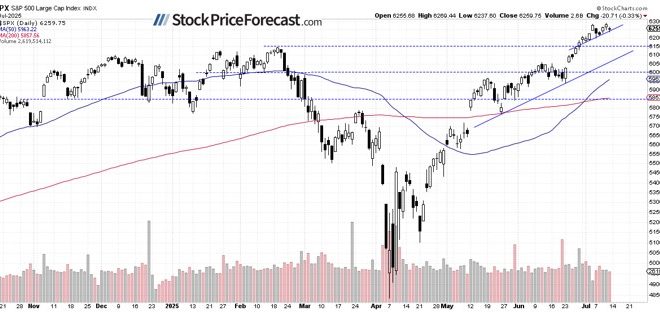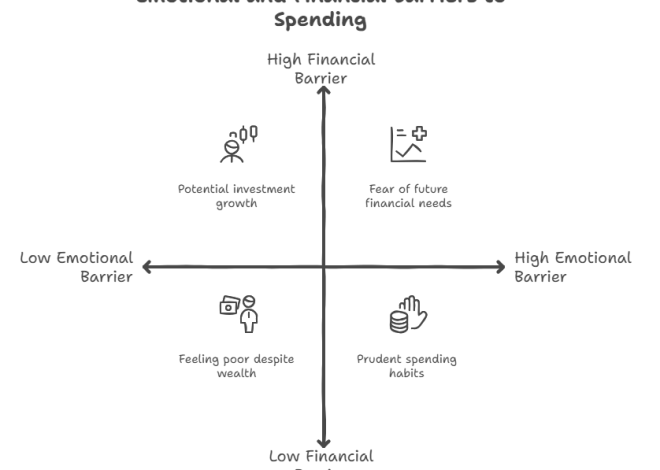
Know Why You Personal Every of Your Investments
 By Dr. Jim Dahle, WCI Founder
By Dr. Jim Dahle, WCI FounderI most likely do not write as typically as I ought to concerning the mainstay of our portfolio (it would assist if Vanguard, BlackRock, and Avantis have been weblog sponsors), which consists of low-cost, broadly diversified index and index-like conventional and exchange-traded mutual funds. You will need to perceive WHY you personal the investments you do (and to purchase them for good causes within the first place).
So, at the moment we’ll undergo each bit of our publicly traded portfolio (85% of the entire portfolio) and focus on why we personal what we personal. We’ll begin on the asset allocation stage for every asset class, then go to the subasset lessons, transfer on to the precise investments, and eventually arrive at some trivia questions.
Why We Personal Shares
Sixty p.c of our portfolio is invested in shares as a result of this permits us to take part within the earnings of probably the most worthwhile companies the world has ever identified. Whereas dangerous, the anticipated and historic long-term returns of shares allowed our portfolio to beat inflation and obtain our monetary targets. Extra conservative investments merely do not develop as rapidly as we’d like them to, on account of decrease charges of return.
Why We Personal US Shares
Forty p.c of our portfolio (2/3 of shares) is invested in home shares. We spend {dollars} now, we anticipate to spend {dollars} later, and we expect betting on the USA, regardless of its issues, remains to be a good suggestion. Now we have no downside with the vast majority of our shares being within the US, even with the valuation differential between US and worldwide shares being as broad because it presently is after an extended interval of US outperformance.
Why We Personal VTI
Twenty-five p.c of our portfolio is within the Vanguard Complete Inventory Market Alternate Traded Fund (VTI). VTI offers a almost free technique to spend money on the equal of all US publicly traded shares. Vanguard has loads of expertise operating index funds, and I belief them to do it properly. We use the ETF model of the fund since this holding is in our taxable account, and whereas the ETF share class of Vanguard index funds is not any extra tax-efficient than the standard mutual fund model, we discover it far simpler to search out strong tax-loss harvesting (TLH) companions for it. Plus, I like the extra management over the method that ETFs supply.
Why We Personal ITOT
It isn’t fully true that 25% of our portfolio is in VTI. It’s true that 25% of our portfolio is in VTI + ITOT (presently about 84% VTI). The iShares Complete Inventory Market ETF (ITOT) is BlackRock’s model of VTI, and it does nearly nearly as good a job. We actually haven’t any qualms holding shares of ITOT till the day we die, and whereas it is not “considerably similar”(the phrases the IRS makes use of) to VTI, the efficiency is so comparable it makes an incredible tax-loss harvesting associate. Are there different nice methods to spend money on the general US inventory market? Sure, there are. We do not assume any of them are considerably higher than these, although, and many them are considerably worse.
Extra data right here:
The Nuts and Bolts of Investing
How Do You Consider and Evaluate Mutual Funds and Alternate Traded Funds?
Why We Personal Worldwide Shares
As I write this submit in June 2025, the US inventory market is up 2.19% on the 12 months, and the worldwide inventory market is up 15.76%. That, in brief, is why I spend money on worldwide shares. Generally worldwide shares outperform US shares. Each are dangerous asset lessons, however they do not have good correlation with one another. Not solely does together with worldwide shares within the portfolio enhance diversification by including 1000’s of further firms to the portfolio, but it surely additionally offers geographic and forex diversification. I anticipate each US and worldwide shares to beat inflation (and fewer dangerous investments like bonds) in the long run, and there can be occasions (like 2025) when US shares zig and worldwide shares zag.
Why We Personal VXUS
Fifteen p.c of our portfolio is within the Vanguard Complete Worldwide Inventory Market Index ETF (VXUS). Since I began investing on this fund 20 years in the past, the expense ratio has fallen and fallen and fallen. Now, like VTI, it is primarily free at simply 5 foundation factors. For 5 foundation factors a 12 months and 30 seconds of my time, I can personal >8,600 shares in 51 international locations. That is a deal.
Why We Personal IXUS
Identical to we’d like a TLHing associate for VTI (ITOT), we additionally want one for VXUS. This associate is the iShares Complete Worldwide Inventory Market ETF (IXUS). It is nearly as low-cost and nearly nearly as good, and we actually do not thoughts holding shares of it endlessly. One might argue that different companions is likely to be higher, however no person can argue one other associate is MUCH higher. IXUS is sweet sufficient. Which is sweet, as a result of one thing like 99% of our cash on this asset class is presently in IXUS on account of some TLHing timing.
Why We Tilt to Small Worth Shares
Twenty p.c of our portfolio is invested in small worth (SV) shares (15% US and 5% worldwide). Small and worth shares have proven increased long-term returns throughout a number of international locations and time durations. This is because of each threat causes (smaller and extra valuey shares usually tend to exit of enterprise; they’re riskier investments) and behavioral causes (massive development shares are higher identified, a lot sexier, extra comfy, and simpler to personal).
Now in our third decade as buyers, we proceed this tilt. Whereas this resolution has not paid off to this point, that’s offset by the truth that the valuation hole between massive development shares and small worth shares has not often been increased and the truth that staying the course with any cheap plan is extra necessary than what that plan is. Our plan is affordable, and sticking with it has helped us to perform all of our targets. We’ll keep it up some extra.
Why We Personal AVUV
As soon as you have chosen to tilt your portfolio, deciding on small worth funds to do it with is so much tougher than simply selecting some Complete Inventory Market (TSM) funds. Initially, we used the Vanguard Small Worth Fund after which ETF (VBR) with the Vanguard S&P Small Cap Worth 600 ETF (VIOV) because the TLHing associate. Nonetheless, I’ve all the time admired Dimensional Funds, significantly after a few of their employees left Dimensional, based Avantis, and started providing ETFs that did not require advisory charges.
After cautious evaluation, we determined to maneuver our small worth funds to the Avantis Small Cap Worth ETF (AVUV). Whereas the price shouldn’t be “Vanguard-low” at 25 foundation factors, it wasn’t that way back that we paid that a lot for Vanguard index funds. We expect the extra price is value it. It’s a lot smaller and a bit extra valuey than the Vanguard choices, and we expect the DFA/Avantis expertise with small worth and little tweaks to the index fund course of (passive philosophy with energetic implementation) is worth it.
Why We Personal DFSV
Since we personal AVUV in taxable, we’d like a TLHing associate for it. As soon as DFA noticed Avantis begin ETFs, Dimensional lastly acquired on board with it. Now, it gives its personal funds in ETF variations with out an advisor requirement. We use the Dimensional Small Worth ETF (DFSV) as a TLHing associate for AVUV.
Why We Personal VIOV
Sadly, we determined to change to Avantis/DFA small worth ETFs after we had began shifting small worth funds into our taxable account, making a legacy funding subject. Our methodology of coping with legacy investments is to make use of them for our charitable contributions. We simply have so lots of them after switching to Avantis/DFA ETFs that it should take some time to do away with them, even given our traditional ranges of charitable giving.
Why We Personal AVDV
Identical to we’ve AVUV on the home facet, we’d like a holding on the worldwide facet. For a very long time, we did not see an incredible possibility for a small worth worldwide fund. So, we used the Vanguard Small Cap ETF (VSS). Now, we use the Avantis Small Cap Worth ETF (AVDV). We do not like that (not like VSS) it avoids rising market (EM) shares, however we would choose to get the worth tilt than to have EM shares.
Why We Personal DISV
The Dimensional Small Worth ETF (DISV) is the plain tax-loss harvesting associate for AVDV. I am not thrilled concerning the 42 foundation level expense ratio (I do not even just like the 36 foundation level ER for AVDV), however I believe it is value it. There aren’t numerous different choices on this area, and I believe these two are the most effective of them. Which of the 2 is the perfect is difficult to say, however during the last three years, DISV has had a slight edge (13.02% vs 12.93% per 12 months). Which is ok since we’ve comparable quantities in every of them.
Why We Personal VSS
Once more, this can be a legacy holding in taxable. We nonetheless personal some VSS. The truth is, about half of our “worldwide small cap” allocation remains to be in VSS, however that is the place charitable contributions got here from final 12 months, the place they may come from this 12 months, and doubtless the place they’re going to come from the 12 months after that. Then, we’ll return after that to VIOV. I might moderately wait to have precisely what I need than to comprehend capital positive factors. VSS is sweet sufficient for now. We owned it for years, so we’re clearly wonderful with it.
Extra data right here:
Worth Tilt – Don’t Give Up on Your Small-Cap Worth Technique
Avantis vs. Vanguard: Does It Make Sense to Change Up Your Portfolio?
Why We Personal Bonds
Twenty p.c of our portfolio is in bonds. Bonds have not been extremely popular in the previous couple of years. A part of that’s the unbelievable run that the US inventory market has had during the last 10-15 years. A part of it’s that 2022 was the worst 12 months for bonds . . . ever. Frankly, numerous the “100% inventory” people are simply efficiency chasing. A lot of them will “uncover” bonds after promoting shares low throughout the subsequent huge downturn.
We personal bonds for a number of causes:
- Bonds may outperform shares, even over lengthy durations.
- We do not have the chance tolerance for a 100% inventory portfolio. Mainly, we found that having some bonds in our portfolio in 2008 helped us to remain the course—75/25, 80/20, 60/20/20, and many others., is about proper for us. It balances our Concern of Lacking out (FOMO) with our Concern of Loss (FOL).
- We need not take 100% inventory threat to make the cash we need not purchase the issues we do not wish to impress folks we do not even like. We have just about reached all of our monetary targets already. Invoice Bernstein says, “Once you’ve received the sport, cease enjoying.” Now we have sufficient in bonds to reside moderately comfortably for the remainder of our lives, and that feels fairly good. It additionally permits us to take funding and enterprise dangers that others will not be comfy taking that repay much more than going 100% shares.
Why We Personal SCHP
Now we have all the time cut up our bond portfolio in half with 50% nominal bonds and 50% inflation-indexed bonds. We’re considerably agnostic about which is able to outperform, however we expect a wholesome dose of inflation-indexed bonds is smart, provided that inflation is the largest long-term threat to bonds. We used to make use of the Vanguard Inflation Protected Securities Fund (VAIPX), however when our 401(okay)s ended up at Schwab and Constancy, I wasn’t prepared to pay further charges (there isn’t a ETF model) to purchase it. We began utilizing the Schwab TIPS ETF (SCHP), which we have now been utilizing for years. Even now that a few of our TIPS are shifting into taxable, we nonetheless discover it an inexpensive holding to make use of. We have by no means needed to TLH it both, so it’s our solely TIPS bond fund. (If we ever do, I might most likely use TIP, the iShares TIPS ETF.) SCHP is 1/sixth the price of TIP, and it is about the identical measurement with comparable holdings and with a barely higher previous efficiency.
Why We Personal Particular person TIPS
There was a time after we have been seduced by the deserves of particular person Treasury bonds. Having no expense ratio and no potential lack of principal when held to maturity are compelling arguments. However so is simplicity. And SCHP is easier than particular person TIPS, particularly when coping with the TreasuryDirect web site. So, we plan to shut our TreasuryDirect accounts and finally get out of the person TIPS sport by shifting proceeds after they mature into SCHP.
Why We Personal I Bonds
Sequence I Saving Bonds (I Bonds) are one other nice inflation-indexed sort of bond. They work barely in another way than TIPS (and labored A LOT higher in 2022 for varied causes). They’re very low-risk investments. Nonetheless, they’ve a few huge downsides. The primary is that you should have a TreasuryDirect account to purchase them, and in the event you’ve ever logged right into a authorities account, you already know why this can be a draw back. The second is that you would be able to solely purchase $10,000 (per entity) per 12 months. That makes them a wonderful funding in the event you’re not that wealthy or in the event you turned wealthy over a few years whereas shopping for I Bonds every year. Neither of these describes us. We do not and can by no means have sufficient I Bonds in our portfolio to justify holding them in any respect, so we plan to shut our TreasuryDirect accounts quickly, liquidate the I Bonds, and transfer the proceeds into SCHP. It’s kind of of a legacy funding subject, but it surely’s not too painful for the reason that positive factors simply aren’t very excessive as a result of I Bonds do not have very excessive returns (properly, besides in 2021-2022).
Why We Personal the TSP G Fund
I spent 4 years on energetic responsibility, and I used to be thus eligible to make Thrift Financial savings Plan (TSP) contributions. We additionally rolled over an previous SEP-IRA and a few money steadiness plans into the TSP after I left service. Whereas it was as soon as the most important a part of our portfolio, the TSP slowly turned much less and fewer vital. I like the G Fund. Treasury returns for cash market threat; it is one of many few free lunches in investing. However it’s also on the chopping block for us, merely to scale back the variety of accounts to handle. Inertia, nostalgia, and that pesky free lunch are holding it alive to this point.
Why We Personal VWIUX
Most of our bonds, like most of our portfolio, at the moment are held in a taxable account. Since we’re in the highest tax bracket, which means utilizing municipal bonds. Our chosen holding right here is the Vanguard Intermediate Time period Tax Exempt Fund (VWIUX). Technically not an index fund, its turnover is about 30% (nonetheless low for intermediate bonds), and it prices 9 foundation factors. It has over 14,000 bonds in it and a length of slightly below six years. We discover intermediate munis to be on the candy spot for bonds—enticing on account of a better yield than short-term munis with decrease volatility than long-term munis.
Why We Personal VTEAX
Now we have needed to TLH VWIUX, so we additionally personal the Vanguard Tax Exempt Bond Index Fund (VTEAX). It’s a true index fund, and it has a barely decrease ER (seven foundation factors) and an ETF model (three foundation factors). The length is barely longer (seven years), however the turnover is a bit decrease (20%) and the yields are very comparable. VWIUX will get the efficiency nod, however VTEAX remains to be adequate for a TLHing associate.
Extra data right here:
I Bonds and TIPS: Which Inflation-Listed Bond Ought to You Purchase Now?
The G Fund (Lastly) Will get Its Day within the Solar
Why We Personal Actual Property
Twenty p.c of our portfolio is invested in actual property. As I’ve typically instructed WCIers, actual property is non-obligatory as asset lessons go. Bonds are non-obligatory to some WCIers, although, and I suppose shares might be non-obligatory too, as long as there may be loads of actual property within the portfolio. However I see little purpose to return down definitively on one facet of the shares vs. actual property debate. I by no means have. Actual property has a lot of benefits, together with:
- Excessive and (performed in an inexpensive method) comparatively predictable long-term returns
- Low correlation with shares and bonds
- Simply leveraged
- Some distinctive tax breaks (most outstanding within the non-public area, particularly when investing instantly)
- Comparatively excessive income-to-return ratio (in the event you care about that)
Of all of the “various” investments on the market, I discover actual property probably the most enticing. It has a really lengthy monitor file, and it’s simply understood. (Purchase property, hire it out, pay all bills with the hire, and preserve what’s left.) Shares, bonds, and actual property. That is what we spend money on. Sure, I do know there are many different issues on the market to spend money on, together with:
- Commodities
- Derivatives
- Currencies
- Cryptoassets
- Collectibles (together with valuable metals)
However, like actual property, they’re all non-obligatory. Not like actual property, they do not all have the above benefits (to be truthful, I believe cryptoassets like Bitcoin could also be THE most tax-efficient property on the planet so long as you by no means must spend something, and even then, it isn’t too dangerous).
Why We Personal VNQ
Our main actual property holding for a few years was merely the Vanguard Actual Property Index Fund or ETF (VNQ), and it nonetheless makes up 5% of our portfolio. VNQ owns all of the fairness Actual Property Funding Trusts (REITs) traded publicly in the USA. Now we have additionally invested instantly (been landlords) and invested in a lot of non-public syndications and funds. Generally I am requested by actual property doubters why I do not simply purchase VNQ. Properly, we do. We personal numerous it. We have solely ever owned it in tax-protected accounts, so I’ve by no means bothered trying very laborious for a TLHing associate. Nevertheless it would not be the worst factor to have in a taxable account (that might be a non-public actual property debt fund).
Trivia
Let’s spend a couple of minutes answering questions I typically get about our portfolio.
Why Do not You Personal [Fill in the Blank]?
You do not have to spend money on every part to achieve success. Select a fairly diversified asset allocation, decide just a few funds to offer you that allocation, and transfer on. How a lot cash you make, how a lot of it you save, and the way properly you keep the course together with your written investing plan will make a far larger distinction in your monetary outcomes than your actual asset allocation or investments. We particularly keep away from speculative investments—these that don’t produce curiosity, dividends, earnings, or rents. These embrace valuable metals, cryptoassets, artwork, collectibles, empty land, commodities, derivatives, and extra. We additionally keep away from choosing particular person shares, enjoyable cash accounts, energetic managers making an attempt to beat the market, and different funding methods proven to have poor outcomes more often than not.
If You Like REITS and Bonds, Why Not Worldwide REITs and Bonds?
Simplicity. I believe an incredible argument may be made for having three asset/subasset lessons in your portfolio. An excellent argument may be made as much as seven. One can nonetheless argue successfully for maybe 10. Past that time, you are simply enjoying together with your cash, particularly whenever you’re placing 1% on this and a couple of% in that. Investing is about reaching your targets whereas taking up the minimal quantity of threat and complexity. It is a single-player sport. My enjoyable cash will get spent on rafting gear and worldwide journey, not playing on the newest meme inventory or crypto fad. You do not have to spend money on every part to achieve success, and most funding “collectors” finally remorse it.
What is the Remainder of the Portfolio Invested In?
Fifteen p.c is invested in non-public actual property: 10% on the fairness facet and 5% on the debt facet. Extra particulars right here.
Why Not Money As an alternative of Bonds? Why Not Lengthy-Time period Bonds? Why Not BOXX? Why Not CDs? Why Not Treasury Payments?
There are many cheap methods to spend money on fastened earnings. For those who assume it actually issues which of these cheap strategies you select, you are mistaken. Your chosen method might be wonderful. We choose to take our threat on the fairness facet, so we preserve time period threat quick to intermediate and decrease credit score threat.
What Was the Level of This Article?
I need YOU to have the power to do THIS train with YOUR OWN portfolio. It is advisable know why you personal each one of many investments you personal. And if you do not have a very good purpose, it is time to do away with it, particularly in a tax-protected account the place there are not any tax penalties to doing so. If it has a considerable amount of capital positive factors in a taxable account, then maybe it turns into a legacy funding till you give it away or die.
What do you assume? Why do you personal every of your investments? Why is it necessary to grasp the function of every of your investments in your portfolio?







